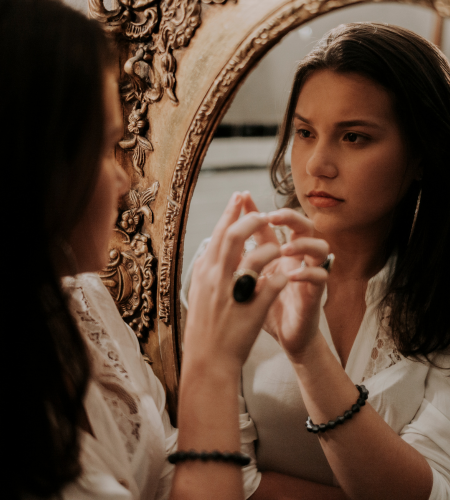
Are you curious about what happens during a hypnotherapy session? Many people are unsure of what to expect, and it can be somewhat intimidating. However, hypnotherapy sessions are designed to help you achieve your desired outcome in a safe and comfortable environment. In this article, we will outline the process of a typical hypnotherapy session and explain what you can expect.

What is hypnotherapy?
Before we dive in, let's quickly cover what hypnotherapy is. Hypnotherapy is a therapeutic technique that uses the power of suggestion to help you make positive changes in your life. It is often used to change habits, desensitize triggers, alter behavior, manage stress, and improve physical, mental, and emotional health.
Hypnotherapy uses hypnosis to access the subconscious mind and create new associations to things that will be beneficial for achieving your goals. These new associations will create less resistance around the things you want, and allow change to be easier.
Hypnosis works by creating a state of deep relaxation in which an individual’s subconscious mind is more open and receptive to suggestion than it usually would be during normal waking consciousness. This allows a skilled hypnotherapist to guide you into a trance-like state where you can explore underlying beliefs that may be contributing to your problems and create new perspectives on how you think about yourself, your life and your current situation. By doing so you can access inner resources that were previously unavailable; typically leading to improved motivation, increased positive feelings and feelings of control over one's behavior.
Also, hypnotherapy enables people to gain insight into their own thought processes; allowing them to become aware of patterns that may have been holding them back from achieving success in various areas of life.
Imagine wanting to loose weight and naturally no longer craving sweets. Or wanting to make a habit of waking up early without arguing with the snooze button. Or, imagine speaking in front of a crowd of people without the racing heartbeat, flush face, and sweaty palms. It may seem impossible, but THAT's what hypnotherapy can help you achieve.
Benefits of Hypnotherapy
Hypnotherapy is a powerful tool for helping people to make positive changes in their lives. It has numerous benefits that can help individuals to create the life they want. Hypnotherapy can be used to reduce stress and anxiety, improve self-confidence and self-esteem, enhance concentration and focus, increase motivation, reduce fear and phobias, alleviate pain, aid in quitting smoking or other addictive behaviors, manage difficult emotions such as anger or sadness, diminish negative thoughts or feelings of worthlessness, and improve overall wellbeing and quality of life. Additionally, hypnotherapy can be used not only to address mental or emotional issues but also physical health concerns such as irritable bowel syndrome, chronic pain management or fatigue.
Hypnotherapy offers so many potential benefits for those looking for positive change in their lives. Not only does it provide a safe space for exploration and introspection but also facilitate the development of new tools for personal growth. It helps individuals become conscious of patterns of thought that no longer serve them which then allows them to strengthen healthier attitudes by building up more adaptive beliefs about oneself, one's life circumstances and interpersonal relationships which leads to improved overall wellbeing through greater internal harmony between body, mind & soul.
For a full list of things hypnosis can help with, check out 149 Powerful Things Hypnosis Can Help With to Improve Your Life.

The initial consultation
Now that we've covered the basics, let's get into what you can expect in a hypnotherapy session.
The first step in the hypnotherapy process is to book an initial consultation. This gives you the opportunity to meet with me and discuss your goals for therapy, as well as any concerns or questions that you might have. It also provides a chance to evaluate if we're a good fit for each other and allows both of us to decide if hypnotherapy is the right approach for you.
During the initial consultation, I will provide a comprehensive overview of hypnosis, explain what you can expect in a hypnotherapy session and answer any questions that you may have about the process. We will also discuss your goals for therapy, where you're at now with your goals, what you've tried in the past, and what you're hoping to accomplish by working together. After discussing all this information, we will decide together if hypnotherapy is the right approach for you and, if so, a plan of action will be created.
How you prepare for your session
If we both decide hypnotherapy is a good fit for your goals, we will book your first session.
Before the first hypnotherapy session, you may find it helpful to take some time to reflect on what you are hoping to accomplish and what areas of your life need attention. Taking the time to think about how you want your life to be different can help clarify and focus our work together.
It is also important to make sure that you are well rested, relaxed, and comfortable before each session. This will help ensure that your mind and body are in the right state for our session.
All sessions are done remotely over the internet, so make sure you have a working webcam and your computer is fully charged so that we do not have any interruptions.
Finally, it may be helpful to prepare a list of questions or concerns that you would like to discuss during the session so we can make the most of our time.

Cognitive Discussion
Sessions are split up into 2 parts, the cognitive portion where we discuss your goals, roadblocks, and strategies for success, and the hypnosis portion where the subconscious mind is reprogrammed based on your goals.
There are 3 main parts to the cognitive portion of the session.
1. We discuss your goals and what you would like to change.
When you log in for your session, we will begin by discussing your goals for therapy in depth. This is to ensure that I fully understand your needs and expectations for the therapy process. We discuss the roadblocks standing in your way and what is keeping you from achieving your goals. I want to hear it all - about what you've tried, what you're too scared to try, and why you want to change. We will also discuss any mental or emotional blocks that may be preventing you from achieving your goals and develop strategies to help you move past those barriers. I may also ask about any relevant medical history or lifestyle habits that may be impacting your progress.
2. I will explain your behavior to you.
Unlike other methods in psychology, hypnotherapists are able to pinpoint why you're engaging in a certain behavior and why it's hard for you to change.
During the cognitive portion of our session, I will explain the programming that is causing your behavior and how this subconscious programming can be changed to help you achieve your goals. This may include explaining your thought patterns, understanding past events that shaped these patterns, or exploring the associations you have created in your subconscious that are causing your issues.
3. We will discuss strategies to help you reach your goals.
Once we have discussed the behavior causing your issues and how it can be changed, we will develop a plan of action to help you achieve your goals.
Action plans always contain subconscious reprogramming AND conscious work. Based on what we discussed, I will take care of the subconscious reprogramming to give your subconscious mind the resources it needs to move you closer to your goals. The conscious work needs to be done by you outside of our sessions. This may include activities that need to be during session, such as reading books or watching videos related. I may also suggest mental exercises, relaxation techniques, or new habits or behaviors that can support your progress in between sessions.
The conscious work is just as important, if not more important, than the subconscious work. The subconscious reprogramming we do within the hypnosis sets up the new neural pathways, but the conscious work is what strengthens those pathways and reinforces the new beliefs we are working to create.
During the first session, the cognitive portion will only last about 10 minutes. But in the following sessions, we will talk for 30-35 minutes.
Prepping for Hypnosis
Once I have a better understanding of your goals, the underlying cause of your behavior, and we've discussed the strategies to reach those goals, this next step involves me helping you become suggestible, or receptive to the new strategy. This helps to open up the subconscious mind so that it is more receptive to suggestions, allowing us to access and reprogram the subconscious programming.
During this time, I will also explain what hypnosis is and answer any questions you may have. It's important to me that you are comfortable with the process and understand the power of your own mind, so I take my time to explain it in detail.
While everyone can be hypnotized, there are different methods to put people in trance based on how their childhood and how they take in information. Because of this, we will go over a series of questions and activities that will help me know how to best hypnotize you and give you suggestions so that you get the maximum benefits of our time together.
This step is only done in the first session. After the first session, you are already primed for the hypnotic state, and I already know how you receive information, so after the cognitive discussion, we would move straight into hypnosis.
Hypnosis
Next, the fun begins!
Now that it's time for hypnosis, we will begin with some relaxation exercises. I will guide you through a relaxation exercise to help you relax and become fully receptive to the process.
The process of entering into hypnosis involves a gradual deepening of conscious awareness, allowing you to move into a state of relaxed concentration and focus. This is often achieved through guided relaxation techniques such as controlled breathing, progressive muscle relaxation and visualization. During this time, I will provide positive reinforcement and suggestion in order to create an environment of trust and security.
I will then begin to introduce suggestions for relaxation, such as closing eyes and breathing deeply. You may be asked to count down from a certain number or imagine a peaceful scene in order to feel calm feelings and increase their level of comfort and focus. Through these techniques, your mind becomes more receptive to suggestions from me. Often times, the hypnotic process includes visualizations or positive affirmations which can help create a deeper level of relaxation in your mind and body. With each suggestion given by me, your mind is taken further into a trance like state until you have reached complete relaxation.
Once you are deeply relaxed, you may start to experience alterations in perception, emotion and thought processes. This is the part that many people fear, but it is very natural!
This depth of trance and relaxation can vary greatly depending on individual preference and goals but people often experience feelings of deep peace and serenity that seem to be impossible outside of hypnosis. Common experiences also include feeling more open and receptive to suggestion, increased creativity and the ability to access memories that had been previously blocked or forgotten.
With continued practice, these altered states can become more frequent and powerful. As you progress in your hypnosis sessions and become more confident with your ability to enter into this state of relaxation and responsiveness, you will be able to achieve self-hypnosis on your own without any assistance from another person. With practice, you can learn how to use self-hypnosis as a tool for stress relief and personal growth to use outside of our sessions together!
So what exactly is a 'trance'? Am I still in control during hypnotherapy?
This is such a common question because there is so much mystery around trance and hypnosis.
Trance is a state of focused attention and concentration that can feel like an altered consciousness. In trance, the person entering it has increased suggestibility and receptiveness to suggestions made by another person or environment. Trance states can range from light relaxation to a deep, almost sleep-like state.
It can be compared to daydreaming, in which a person's conscious thoughts are relaxed and suspended; allowing for more imaginative mental activity.
In hypnotherapy, this state is used therapeutically in order to access subconscious resources. This allows the client to gain insight into issues that are typically blocked when they are in a waking state, such as negative beliefs or emotions that inhibit progress in areas like physical health, relationships, career development or mental wellbeing. During hypnotherapy sessions, clients may experience profound physical sensations of relaxation through which they can begin to identify patterns in their thoughts, feelings, and behaviors that may be inhibiting progress towards specific goals. With the help of the hypnotherapist, these patterns can be challenged in order to create new habits that will ultimately lead to greater well-being.
During trance you can still be in control and will not do anything you do not want to do. You still have full control over your experience and are always able to end the session at any time if you become uncomfortable or need a break. You still retain some level of control over your reactions to any external stimuli or suggestions given by their hypnotherapist - meaning if something really doesn't feel right to you, you can reject the suggestions. This is why hypnosis is not mind control.
When you're in trance, you will usually remain aware of your surroundings, but may feel different as you experience an inner world of heightened awareness, imagery and feelings.

Therapy
Once we've completed our relaxation exercises, I will guide you through a series of imagery and suggestions. This is the "meat" of the session, where we access and reprogram the subconscious programming hindering your progress.
During hypnosis, I will make suggestions that are tailored to your goals and our discussion prior to this point. I may also use guided imagery or metaphors as part of my suggestion style, depending on what your suggestibility is. However, you will remain conscious and aware of everything that is happening throughout the session.
The hypnosis portion usually lasts about 20 minutes, but with some people it can be longer, depending on how deeply they are able to go into trance.
Some hypnotherapy techniques you may experience while in hypnosis:
Hypnotic suggestions
Hypnotic suggestions are ideas that are presented to the subconscious mind and accepted without question. They work by bypassing conscious resistance and judgments, allowing for more openness to new ideas. A hypnotic suggestion may be that you are naturally attracted to healthy foods or that you feel relaxed when speaking in front of a group of people.
Hypnotic suggestions are individualized to each person's needs and goals, so they are highly personalized to each individual person and session.
Metaphors
Metaphorical approaches in hypnotherapy involve the use of stories, symbols or metaphors to illustrate how the client can learn from life experience or past traumas. They may be used in combination with hypnotic suggestion or as stand-alone statements.
Metaphors are particularly useful for helping you unlock new meaning from your experiences and gain new perspectives. Furthermore, metaphors offer a safe space for you to explore difficult emotions without being overwhelmed by them. It helps bring clarity and insight to those who may be feeling stuck in certain areas of life as well as allowing you to develop self-awareness. By using metaphors within hypnotherapy sessions, you can often feel empowered in your own decisions without feeling judged or pushed into something you don't want to do.
Metaphors can be powerful tools for accessing and reprogramming the subconscious mind because the subconscious mind communicates in metaphors. This means that when metaphors are suggested to you in hypnosis, the subconscious mind absorbs it quickly and without resistance making it a more potent suggestion that will lead to quicker change.
Ego-strengthening
In all of my sessions, I will usually use ego-strengthening suggestions that reinforce your ability to access your own inner resources to overcome challenges to achieve your goals. Ego-strengthening is a powerful tool that helps to build self-love, self-esteem and confidence which can be used in all areas of life.
Ego-strengthening approaches in hypnotherapy involve suggestions that empower you, provide insight and understanding, build competencies and confidence, create positive change and allow for healing. This approach can include affirming statements such as “You find your resilience to adversity grows in each moment” or “You have the power to make this happen” or by modeling desirable behavior that you can take on. Ego-strengthening is a powerful way to help you gain control of your own life and move forward.
Therapeutic Imagery
Therapeutic imagery is the use of guided imagery or visualization to help you gain insight, access your subconscious mind and resolve inner conflicts. This approach can be used for relaxation or to connect with personal strengths and resources.
During a hypnotherapy session, I may take you through this process in order to relax you further, create mental clarity, and help you tap into your subconscious mind. Therapeutic imagery may involve thinking of a special place that creates calmness within you, imaging yourself succeeding at something or creating an image of your inner strength or power. This process is highly individualized to the person's needs and goals.

Awakening From Hypnosis
Once our time in hypnotic trance comes to an end, I will guide you out of hypnosis and back to a fully conscious state. This will consist of using numbers to count you up and out of hypnosis.
We may then discuss your experience in trance and any new insights or understanding that you have gained during the session. While it is important to take time to reflect on these changes, it's often more important to let the suggestions simmer in the subconscious mind. Once you are out of hypnosis, your critical filter is active again. If you start to talk about the hypnosis, you run the risk of your critical filter taking over, overanalyzing, and diluting the suggestions making them less effective.
Homework/Homeplay
At the end of each session, I will provide you with an action plan to practice in between sessions. This could include continuing visualizations or metaphors at home as well as other activities such as journaling, meditation or relaxation. The homework is designed to bring about further change and to support our work together during hypnotherapy sessions.
I like to use the word homeplay because this work should be FUN. The work that I give encourages you to be an active participant in your healing, and will always be actionable baby steps that will move you towards your goal. This helps reinforce what we worked on during the session and encourages positive change in between sessions.
Ending the hypnotherapy session
At the end of the very end of session, I will answer any questions and we will schedule your next session.
As you leave the session, you may notice that your mood has improved, and you'll be better able to make decisions with clarity and confidence. You may also notice that you have more access to your own resources, such as positive feelings, creativity or personal power.
How Many Sessions Do I Need?
This is the hardest question to answer. The beauty of hypnotherapy is that no session is ever the same. Hypnotherapy sessions are individualized to each person's needs and goals, so it is difficult to predict what will happen in a session ahead of time, or even how many sessions may be needed.
Some issues, like weight loss, will require a few months of sessions, while an issue like nail biting may be a one-session treatment. People with traumatic memories will need more sessions than someone who doesn't have trauma surrounding their issues. The number of sessions you need will depend on your individual goals and personal situation.
That being said, it is usually recommended to attend at least 4-6 sessions of hypnotherapy in order to gain the most benefit and make lasting change. Each session builds on the work of previous sessions, so that over time, the therapy becomes more effective.
How to Get Started
Now that you know what you can expect in a hypnotherapy session, if you’d like to begin the process of hypnotherapy, I recommend setting up a free 20 minute consultation with me. During this session, we can discuss your goals and expectations from hypnotherapy, as well as any apprehensions you may have about the process.
Conclusion
Hypnotherapy is a safe and natural therapy that has been proven to be effective in helping people make lasting changes by reprogramming their subconscious mind. By working with me, you can look forward to unlocking positive feelings within, the power of your mind and achieve long-term success with your goals.
I hope this article has given you a better insight into what to expect from a hypnotherapy session, and how powerful and effective this type of therapy can be. If you have any questions or would like to discuss your individual situation further, please don’t hesitate to reach out!









+ view comments . . .
+
view comments . . .
-